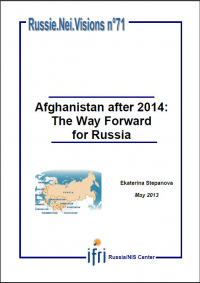Afghanistan after 2014: The Way Forward for Russia Russie.Nei.Visions, No. 71, May 2013
It may appear that Russia is equally dissatisfied with both Western security’s presence in and its departure from Afghanistan planned for 2014, but whether the Western withdrawal is seen as more of a gain a loss depends on how Moscow itself assesses and balances its own security concerns in the region: instability, extremism and narcotics.

At the same time the spill-over of violence and extremism does not pose a direct threat to Russia itself for whom the main implications of U.S./NATO withdrawal from Afghanistan are in Central Asia. Moscow’s main strategy to address potential cross-border repercussions for its Central Asian allies and the increase in Western back-up and transit-related presence in Central Asia is to intensify security and economic cooperation with Russia’s CSTO partners in the region. This will be coupled with keeping a certain distance from Afghanistan, despite the large scale challenge posed by the inflow of Afghan heroin—the most direct Afghanistan-related security concern for Russia. Regarding drug control and counternarcotics in particular, Russia will have to rely on whatever government will be in place in Afghanistan. This explains Moscow’s genuine interest in increasing functionality and legitimacy of the Afghan state, which can only be achieved through an intra-Afghan political process and power-sharing arrangement.


